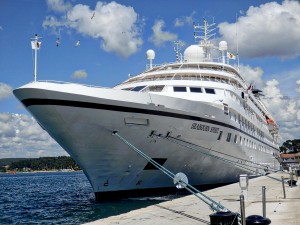By George Kennedy
On August 13, in the criminal case of United States v. Said, the Fourth Circuit affirmed the convictions but vacated the sentences of six individuals involved in acts of piracy in the Gulf of Aden. Defendants in this case are Somali pirates apprehended by the U.S. Navy after a foiled plot to seize a merchant ship.
Attempts to Seize Merchant Ships
In an area notorious for piracy and hostage-taking on the high seas, Defendants attempted, on at least two separate occasions, to board merchant ships, take the crew members hostage, and obtain ransom money. Defendants’ first attempt came in 2010. At that time, Defendants secured a small motor boat, loaded it with weapons, and travelled into the Gulf of Aden searching for a merchant ship to seize. Soon after, however, Defendants’ boat was noticed by the HMS Chatham of the British Royal Navy. Sailors from the Chatham intercepted Defendants, confiscated their weapons, and ordered them to return home.
Undaunted by their initial failure, Defendants again set out in the same motor boat in order to seize a merchant ship in April 2010. Before sunrise, Defendants attempted to storm what they believed was a merchant ship crewed by civilians. Defendants fired rounds from AK-47s in order to scare the crew. Unbeknownst to Defendants, however, the ship they were trying to seize was in fact the USS Ashland, a dock landing ship of the United States Navy. Personnel aboard the USS Ashland promptly returned fire on Defendants, killing one member of their crew and destroying their boat. All Defendants were apprehended and taken prisoner by the U.S. Navy. The U.S. Navy transported Defendants to a naval brig in Norfolk, Virginia where they awaited trial.
Trial and Eighth Amendment Challenge
While Defendants were initially indicted by a grand jury in April 2010, Defendants awaited trial on the substantive charges leveled against them until February 2013. Defendants were charged with piracy, conspiracy to commit hostage taking, and several other related charges stemming from Defendants’ actions in attempting to seize the USS Ashland and from Defendants’ attempt to commit piracy when intercepted by the HMS Chatham. Following a six-day trial, the jury convicted Defendants on all counts.
Following their convictions, Defendants filled motions for judgment of acquittal, as well motions to invalidate the mandatory life sentence imposed by 18 U.S.C. § 1651, the anti-piracy statute. While the district court denied the motion for judgment of acquittal, the district court did hold that the mandatory life sentence as imposed by § 1651 violated Defendants’ Eighth Amendment Rights. Accordingly, the district court upheld the convictions of Defendants, and imposed sentences ranging from 360 months to 510 months imprisonment.
Issues on Appeal
On appeal, Defendants contended that the district court made three errors: (1) denying their motions to dismiss the piracy charge, (2) improperly instructing the jury on the elements of piracy under § 1651, and (3) denying their motions for judgment of acquittal. The Fourth Circuit dismissed all Defendants’ claims.
First, the Fourth Circuit held that, contrary to Defendants’ arguments, the Fourth Circuit faithfully applied the principles of United States. v. Dire, the foundational case on interpreting § 1651. Because the district court made no error in interpreting § 1651, the Fourth Circuit held that the district court made no error in denying the motions to dismiss the piracy charge nor did the district court err in instructing the jury on the elements of piracy under § 1651. As to the denial of Defendants’ motions for judgment of acquittal, the Fourth Circuit also held that district court did not err. The Fourth Circuit found that there was more than sufficient evidence in the record to support each charge for which Defendants were convicted. Therefore, the district court made no error in refusing to acquit Defendants.
The government also raised an issue on appeal. The government contended that the district court erroneously determined that 18 U.S.C. § 1651’s mandatory life sentence, as applied to the defendants, violates the Eight Amendment’s prohibition against cruel and unusual punishment. To this point, the Fourth Circuit agreed, and vacated the sentences imposed by the district court, and remanded for resentencing. In so holding, the Fourth circuit argued that the seriousness of the crime of piracy made imposition of a life sentence not “grossly disproportionate” to the crime committed. Furthermore, the Fourth Circuit argued that cases that did reduce the severity of punishments based on the Eighth Amendment almost always involved capital punishment, and that cases which did not reduce the severity of punishment involved crimes far less serious than piracy. Therefore, the Fourth Circuit urged deference to the text of § 1651 which mandates life imprisonment for piracy.
Reversed, Vacated, and Remanded
Accordingly, the Fourth Circuit reversed the judgment of the district court in regards to sentencing, vacated the sentences imposed, and remanded the case for resentencing.


